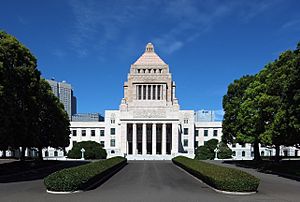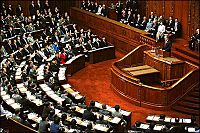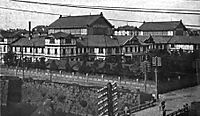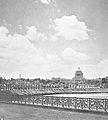Diet of Japan facts for kids
The Diet of Japan (国会, Kokkai) is Japan's national law-making body, similar to a parliament or congress in other countries. It is located in the National Diet Building in Nagatachō, a part of Chiyoda, Tokyo.
The Diet is a bicameral legislature, which means it has two separate parts or "houses." These are the House of Representatives, known as the lower house, and the House of Councillors, which is the upper house. People in Japan directly elect the members of both houses. One of the most important jobs of the Diet is to choose the Prime Minister, who leads the country.
Contents
How the Diet Works
The Diet is where new laws are discussed and approved for Japan. Both houses work together to make sure that laws are fair and represent the wishes of the Japanese people.
The Two Houses
The Diet has two main parts, each with different roles:
House of Representatives
This is the "lower house" and usually has more power. Its members are elected for four-year terms. The House of Representatives can approve treaties, decide on the national budget, and has the final say on most laws. If the two houses disagree on a law, the House of Representatives can often pass it again with a special vote.
House of Councillors
This is the "upper house." Its members are elected for six-year terms, and elections happen every three years for half of its members. The House of Councillors reviews laws passed by the House of Representatives. It acts as a check, making sure laws are well-thought-out before they become official.
Choosing the Prime Minister
One of the Diet's biggest responsibilities is to select the Prime Minister. The Prime Minister is usually the leader of the political party that has the most seats in the House of Representatives. Once chosen by the Diet, the Prime Minister then forms a cabinet, which is a group of ministers who help run the government.
History of the Diet
The idea of a national assembly in Japan started a long time ago.
The Imperial Diet (1889-1947)
The Diet first met in 1889. Back then, it was called the Imperial Diet. It was created under the Meiji Constitution, which was Japan's first modern constitution. At that time, the Emperor had a lot of power, and the Diet's role was more limited compared to today.
The Modern Diet (1947-Present)
After World War II, Japan adopted a new constitution in 1947. This new constitution changed the Diet into the form we see today. It made the Diet the highest body of state power, meaning it is the most important part of the government. The new constitution also made sure that the people, through their elected representatives, had the ultimate power.
Gallery
Related topics
Images for kids
See also
 In Spanish: Dieta de Japón para niños
In Spanish: Dieta de Japón para niños












